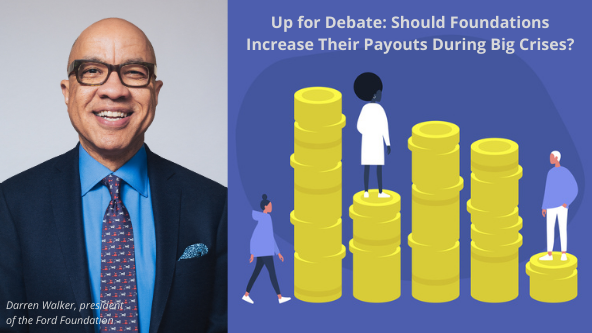
Larry Kramer is a scholar of the highest order and sharpest skill. I’ve learned much from his wise counsel over the years. I admire his incisive thinking and writing.
Reflecting on Kramer’s essay, “Foundation Payout Policy in Economic Crises,” I find his data and analysis to be unimpeachable. He marshals the facts—and posits a set of conclusions that are equally inevitable and incontrovertible. No one makes a case more meticulously or effectively than Kramer does.

And yet, colleagues can respectfully test and contest each other’s views, without sacrificing their respect for one another. And in this instance, I struggle with two embedded assumptions within Kramer’s essay: One is about the future. The other is about the responsibility that foundations bear in building it.
First, I question the essay’s implicit predicate that past is prologue—that we can assume, with certainty, that markets will continue to rise and progress, like interest or dividends, and will somehow compound at a steady pace commensurate with our grantmaking. I’m not so sure.
In my eyes, the historic disruption underway, right now, is different in kind, not just degree. It has pushed us to a precipice. We are at an existential moment from which there may be no return unless we act with unprecedented urgency, creativity, and determination.
Intersecting crises of extreme inequality, climate catastrophe, racial injustice, and autocratic, anti-democratic impunity—multiplied not just by each other, but also by a pandemic and economic devastation—pose grave peril to our society’s very survival.
I believe we are facing a set of profound challenges on a scale we’ve never before confronted. As a planet, and a nation, our window is closing. If we only do what we’ve always done, the worst may well sneak up on us while we prepare for some rosy version of economic perpetuity.
This leads to the second assumption with which I take issue—that society, somehow, is better served when foundations value their own preservation over the survival of the civil society and nonprofit organizations that work on the frontlines of social change and social justice. Indeed, Kramer’s argument betrays a kind of ideology about the superiority of endowment-led giving, which I believe to be deeply flawed.
My view is, legacy foundations, like the institutions that Kramer and I are privileged to steward, must stand guard against the danger of biasing preservation forever over innovation for good. We must constantly check ourselves to ensure that we’re not limiting our interventions to normative policies, practices, tools, and habits. We must also understand that we live within dynamic contexts that may require us to do things differently.
In his essay, Kramer explores, at some length, the idea of “moral hazard,” the principle, borrowed from economics, that the potential for disaster resides in those spaces where one party is incentivized to take risks without bearing responsibility for the consequences. As an academic matter, Kramer’s take is absolutely correct. But his essay neglects to explore another kind of moral hazard: The hazard of ignoring the suffering all around us—of missing our opportunity to address what Dr. Martin Luther King Jr. called “the fierce urgency of now.”
Consider that, today, the nonprofit sector is suffocating; many organizations that closed their doors this year will never reopen. What would it mean for a foundation to shore up its grantmaking power for the future, while the most essential organizations to which we direct funding disappear? What would it say about our morals, our mission, the legitimacy of our license to operate?
I commend Kramer for his analytic acumen, to say nothing of his consistency. He prosecutes the very same argument in these pages as he does in private conversation. What’s more, Kramer and I share intentions and objectives—the commitment to promote ideas and institutions that better our communities.
Ultimately, though, as Aristotle taught his students thousands of years ago, logos is unpersuasive without pathos. To me, the strongest logic, data, and analysis in the world rings hollow without empathy for the unprecedented circumstances in which we find ourselves—for the horrors and hazards they have wrought.
No doubt, the endowment is the engine of the work, and the capital markets keep that engine fueled and firing. But the purpose of what we do is not mechanical engineering for its own sake. The purpose is driving toward justice, where and when people need it.
Support SSIR’s coverage of cross-sector solutions to global challenges.
Help us further the reach of innovative ideas. Donate today.
Read more stories by Darren Walker.

